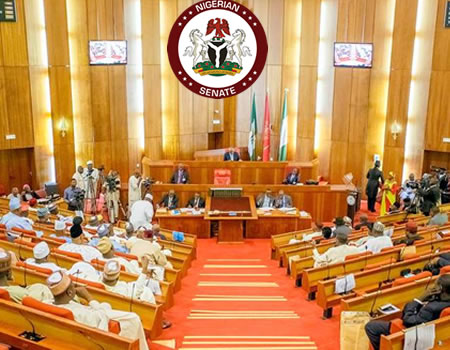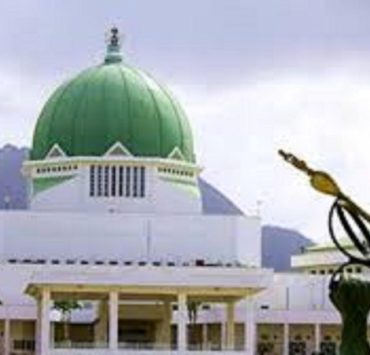Senate Approves MTEF/FSP, Pegs Oil Price At $57 per barrel

The Senate on Wednesday approved the 2022 – 2024 Medium Term Expenditure Framework (MTEF) and Fiscal Strategy Paper (FSP).
The Red Chamber maintained the crude oil benchmark price of $57 per barrel as proposed by President Muhammadu Buhari.
This followed the adoption of the report of the joint finance committee, chaired by Senator Adeola Olamilekan.
It also approved the daily oil production of 1.88 million barrels per day (mbpd), 2.23mbpd, and 2.22 mbpd for 2022, 2023 and 2024 respectively.
The lawmakers retained federal government projected revenue of N8.36 trillion; proposed expenditure of N13.98 trillion and fiscal deficit of N5.62 trillion.
They maintained the exchange rate of N410/$ proposed by the executive for 2022 – 2024.
The projected Gross Domestic Product (GDP) growth rate of 4.20% and the inflation rate of 13% were also approved.
President Buhari had in July, sent a letter to the National Assembly detailing proposals for a budget deficit, crude oil benchmark price, exchange rate, among others.
Olamilekan, the Chairman of the joint committee on finance, who presented the report, said the Committee also recommended that the projected new borrowings of N4.89 trillion and $3.5 billion International Monetary Fund (IMF) loan at the rate of 0.01% to 0.02% be approved, subject to the provision of details of the borrowing plan to the National Assembly.
Other recommendations
The Senate also approved the following sundry parameters in the 2022-2024 MTEF/FSP:
Statutory transfers, totalling, N613.4 billion
Debt Service estimate of N3.12 trillion
Sinking Fund to the tune of N292 billion
Pension, Gratuities & Retirees Benefits of N567 billion
Aggregate FGN Expenditure of N13.98 trillion; made up of Total Recurrent (Non-debt) of N6.21 trillion; Personnel Costs (MDAs) of N3.47 trillion; Capital expenditure (exclusive of Transfers) N3.26 trillion; Special Intervention (Recurrent) amounting to N350 billion; and Special intervention (Capital) of N10billion
Salaries and Wages Commission should review the salary structure of all the MDAs, in other to come up with a new salary structure for the MDAs that will reflect the true financial position of the Agencies.
There should be a continuous review of the Fiscal Responsibility Act to ensure that all revenues are remitted to the CRF as at when due, in order to curtail frivolous deductions and diversion of funds by the MDAs.
All laws relating to mining businesses should be reviewed as a matter of urgency to ensure upward review of rates applied to royalties, ground rent and licenses renewal of all mining companies operating in Nigeria to ensure transparency in the collection of revenue by the relevant agencies of the government and also look into the issues of illegal mining activities by recommending stringent sanctions in the proposed new laws.
The Nigeria Customs Service should accelerate the process of installing scanners at all Ports across the country to curb the issue of underpayment of customs duties on imported goods which has resulted in huge loss of revenue to the government and to further improve its activities at all borders across the country in order to curb the issues of smuggling across border areas.
The Committee recommended urgent implementation of the Petroleum Industry Act (PIA) recently assented to by the President in order to curtail the problems of smuggling and round-tripping of petroleum products imported into the country.
The proposed budget of the Government Owned Enterprises (GOEs) should be reviewed upward to show the reflection of their capabilities to generate more revenue as a result of the findings of the Joint Committee.
The offices of the Accountant General (AGF), Auditor General of the Federation (AuGF) and Fiscal Responsibility Commission (FRC) be strengthened in the area of staffing and proper funding of its activities to ensure optimal performance of their duties in order to adequately monitor the remittances of all government revenues.
The Federal government budget be reviewed and be purged of some agencies that demonstrated capacity to stand on their own without any recourse to the Federal Government of Nigeria Budget. For example; the National Agency for Food and Drug Administration and Control (NAFDAC) and Nigerian College of Aviation Technology, Zaria (NCAT).
Lawyard is a legal media and services platform that provides enlightenment and access to legal services to members of the public (individuals and businesses) while also availing lawyers of needed information on new trends and resources in various areas of legal practice.













